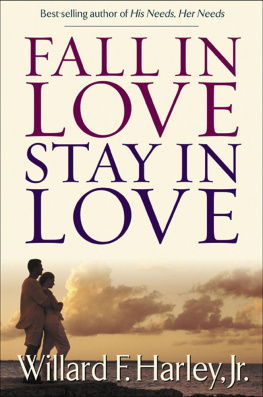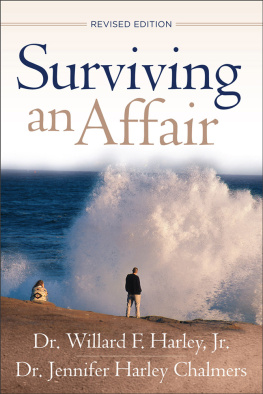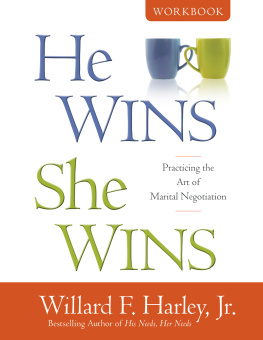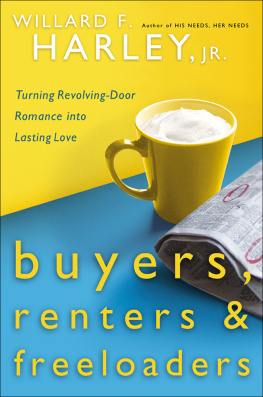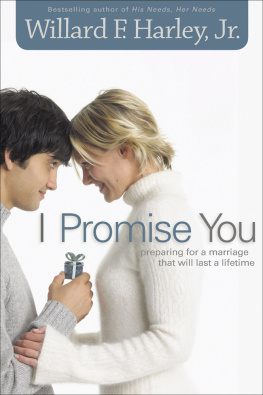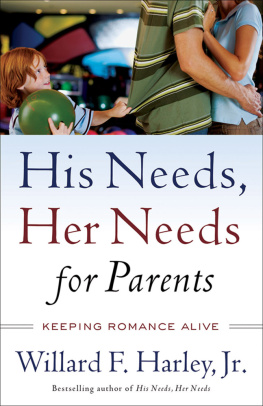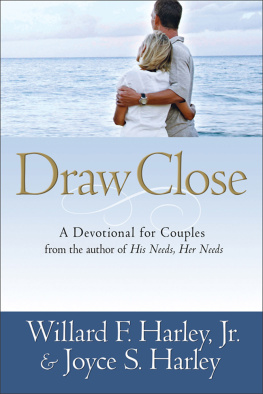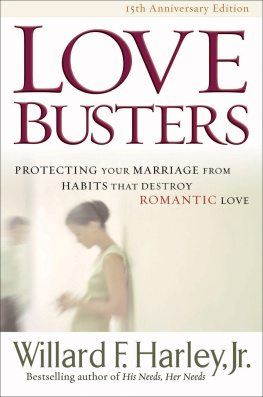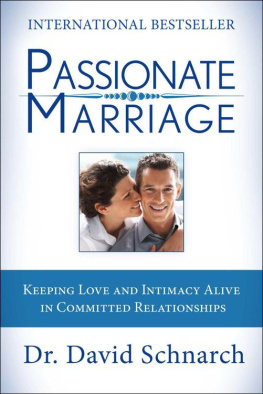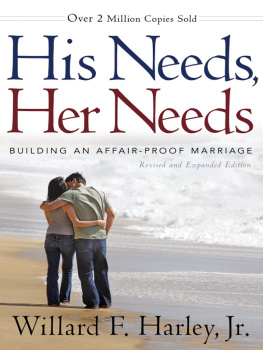Willard F. Harley Jr. - Fall in Love, Stay in Love.
Here you can read online Willard F. Harley Jr. - Fall in Love, Stay in Love. full text of the book (entire story) in english for free. Download pdf and epub, get meaning, cover and reviews about this ebook. City: Grand Rapids, year: 2001, publisher: Baker Publ., genre: Home and family. Description of the work, (preface) as well as reviews are available. Best literature library LitArk.com created for fans of good reading and offers a wide selection of genres:
Romance novel
Science fiction
Adventure
Detective
Science
History
Home and family
Prose
Art
Politics
Computer
Non-fiction
Religion
Business
Children
Humor
Choose a favorite category and find really read worthwhile books. Enjoy immersion in the world of imagination, feel the emotions of the characters or learn something new for yourself, make an fascinating discovery.
- Book:Fall in Love, Stay in Love.
- Author:
- Publisher:Baker Publ.
- Genre:
- Year:2001
- City:Grand Rapids
- Rating:5 / 5
- Favourites:Add to favourites
- Your mark:
- 100
- 1
- 2
- 3
- 4
- 5
Fall in Love, Stay in Love.: summary, description and annotation
We offer to read an annotation, description, summary or preface (depends on what the author of the book "Fall in Love, Stay in Love." wrote himself). If you haven't found the necessary information about the book — write in the comments, we will try to find it.
Fall in Love, Stay in Love. — read online for free the complete book (whole text) full work
Below is the text of the book, divided by pages. System saving the place of the last page read, allows you to conveniently read the book "Fall in Love, Stay in Love." online for free, without having to search again every time where you left off. Put a bookmark, and you can go to the page where you finished reading at any time.
Font size:
Interval:
Bookmark:
Other books by Willard F. Harley, Jr.
His Needs, Her Needs
Love Busters
5 Steps to Romantic Love
Your Love and Marriage
Surviving an Affair
His Needs, Her Needs for Parents
The One

2001 by Willard F. Harley, Jr.
Published by Revell
a division of Baker Publishing Group
P.O. Box 6287, Grand Rapids, MI 49516-6287 www.revellbooks.com
Ebook edition created 2012
eISBN 978-1-58558-701-8
For individual use, forms in appendixes may be copied without fee. For all other uses, all rights reserved. No part of this publication may be reproduced, stored in a retrieval system, or transmitted in any form or by any meansfor example, electronic, photocopy, recordingwithout the prior written permission of the publisher. The only exception is brief quotations in printed reviews.
Library of Congress Cataloging-in-Publication Data is on file at the Library of Congress, Washington, DC.
Appendixes:
MARRIAGES
Ive been counseling couples with marital problems for over forty years, and during that time Ive learned what makes marriages succeed and what makes them fail. But I sure didnt start out knowing that. In fact my first ten years of marriage counseling taught me only one thingthat I was not qualified to counsel. Although almost every couple I saw was sincerely grateful for my advice, I cannot think of a single couple I actually helped. Most of their marriages ended in divorce, and the rest continued to have serious problems.
Miserable Beginnings
One couple I counseled was my pastor and his wife. The choir director and my pastors wife were having an affair, and I tried to help end it. I explained to her how the affair was threatening the happiness and success of their children and ruining her husbands ministry, and how the choir directors wife and children needed him just as much as her husband and children needed her. But she replied that since God was a God of love, he had approved her relationship with the choir director by giving her the feeling of love for him.
I had come face-to-face with the irrationality that the feeling of love can create, and I didnt know how to handle it. Eventually my pastors wife and the choir director divorced their respective spouses and married each other. The children in both families suffered greatly throughout the entire ordeal, and to the best of my knowledge are still suffering. The church began a downward spiral from which it never recovered and it eventually disbanded. This tragedy took place because my pastors wife had fallen out of love with her husband and fallen in love with the choir director. (Incidentally, after a few years of an unhappy marriage, the choir director had another affair and divorced my pastors former wife.)
My pastor was not alone in the tragedy of divorce. His was just one of a host of marriages caught up in a wave that was overwhelming families in the mid-1960s. This trend toward divorce would escalate over the next twenty years until more than half of all marriages were ending in divorce. I didnt know that at the time. I thought that this failure was, at least in part, due to my inexperience. I blamed myself, thinking that I should not have tried to give advice, that I should have left it to an expert.
Expert Failures
Over the next few years, couples kept asking for my advice regarding marriage, especially after I earned a Ph.D. degree in psychology. So instead of turning these people away, I decided to learn enough about marriage counseling to help save their marriagesI decided to become an expert. After all, if scientists could send men to the moon, surely they would know how to save marriages.
I read books on marital therapy, was supervised by experts in the field, and worked in a clinic that specialized in marital therapy and claimed to be the best in Minnesota. But none of it helped. I was still unable to save marriages. Almost everyone who came to me for help ended up like my pastordivorced.
But in my effort to become an expert, I made a crucial discovery: I wasnt the only one failing to help couples. Almost everyone else working with me in the clinic was failing as well! My supervisor was failing, the director of the clinic was failing, and so were the other marriage counselors who worked with me. And then I made the most astonishing discovery of all: Most of the marital experts in America were also failing.
What made me unique among marriage counselors was my curiosity to know if my efforts really worked. Hardly any other therapist I knew wanted to know about the outcome of his or her therapy. Many did not know they were failing because they never followed up on their cases to see how the marriages were doing. But I had access to their cases, so I did the follow-up for them. In the clinic where I worked, I couldnt find any therapists who were actually saving marriages. And to make matters worse, many of these marital experts were divorced themselves. The director of the clinic, and creator of their successful marital therapy program, was divorced shortly after I left the clinic.
Was I working with a particularly inept group of therapists? Or were the problems I witnessed only the tip of the iceberg? To satisfy my curiosity, I did what I should have done in the very beginning of my ventureI read studies that evaluated the effectiveness of marital therapy in general. To my surprise, I learned that marital therapy throughout America had the lowest success rate of any form of therapy. In one study, I read that less than 25 percent of those surveyed felt that marriage counseling did them any good whatsoever, and a higher percentage felt that it did them more harm than good.
Searching for Answers
What a challenge! Marriages were breaking up at an unprecedented rate, and no one knew how to fix them! So I made it my own personal ambition to find the answer, and I looked for that answer not in books, scholarly articles, or experts but rather among those who came to me for answerscouples who were about to divorce. I stopped counseling and started listening as spouses told me why they were ready to throw in the towel. What did they have when they decided to marry that they lost somewhere along the way, and what would it take for them to find it again?
By 1975 I had discovered why I and so many other marital therapists were having trouble saving marriageswe did not understand what makes marriages work. We were all so preoccupied with what seemed to make them fail that we overlooked what made them succeed. Couples would come to my office for counseling because they were making each other miserable. So I thought, as most others thought, if I could simply get them to communicate more clearly, resolve their conflicts more effectively, and stop fighting with each other so much, their marriage would be saved. But that wasnt the answer.
Couple after couple explained to me that they didnt marry each other because they were communicating so clearly or resolving their conflicts effectively or were not fighting with each other. They married because they found each other irresistiblethey were in love. But by the time they came to my office, they had lost that feeling of love. Many actually found each other repulsive. And one of the most important reasons that they were communicating so poorly, resolving their conflicts so ineffectively, and fighting so much was that they had lost their feeling of love.
If your marriage was in trouble and I asked you what would it take for you and your spouse to be happily married again, what would you say? My guess is that at first you might not imagine that ever happening. You might think that the only way you could be happily married would be if you were married to someone else! But if I persisted, and you were able to reflect on my question, you might say what others have told me: We would be happily married again if we were in love.
Next pageFont size:
Interval:
Bookmark:
Similar books «Fall in Love, Stay in Love.»
Look at similar books to Fall in Love, Stay in Love.. We have selected literature similar in name and meaning in the hope of providing readers with more options to find new, interesting, not yet read works.
Discussion, reviews of the book Fall in Love, Stay in Love. and just readers' own opinions. Leave your comments, write what you think about the work, its meaning or the main characters. Specify what exactly you liked and what you didn't like, and why you think so.

